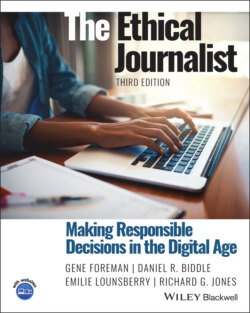Читать книгу The Ethical Journalist - Gene Foreman - Страница 41
Journalism’s Guiding Principles
ОглавлениеIn 1997, Kovach and Rosenstiel began two years of interviews, forums, and surveys intended to define journalism’s purpose. There were clues in the ethics codes adopted by national journalism organizations. Those codes asserted that journalists serve the public and that they are dedicated to truth and fairness.
Beyond writing the codes, journalists had not spent much time analyzing what their guiding principles were. For one thing, they thought it was evident that they worked in the public interest and that the news they published or broadcast defined their standards. For another, their lawyers had cautioned against putting these standards in writing, lest they be used against them in court. And, finally, meeting the deadlines for today’s newscast or tomorrow’s newspaper always seemed to take priority over the intellectual exercise of writing down their professional beliefs.
However, as Kovach and Rosenstiel’s research proceeded, it became clear that certain beliefs were widely and strongly held. These beliefs guided the authors to a definition of journalism’s primary purpose: “to provide citizens with the information they need to be free and self‐governing.” They elaborated in The Elements of Journalism: “The news media help us define our communities, and help us create a common language and common knowledge rooted in reality. Journalism also helps identify a community’s goals, heroes and villains.” 4
An affirming statement of journalism’s purpose was crafted by Leonard Downie Jr., editor of The Washington Post, and Robert G. Kaiser, The Post’s managing editor, in their 2002 book The News About the News. Downie and Kaiser wrote:
Citizens cannot function together as a community unless they share a common body of information about their surroundings, their neighbors, their governing bodies, their sports teams, even their weather. Those are all the stuff of news. The best journalism digs into it, makes sense of it, and makes it accessible to everyone. 5
Kovach and Rosenstiel identified the key principles – which they called the “elements” – of journalism. Six of those are listed here:
Journalism’s first obligation is to the truth. Although truth is difficult to define, there was unanimity among journalists that the first step is “getting the facts right.” Kovach and Rosenstiel concluded that “the disinterested pursuit of truth” is what distinguishes journalism from other forms of communication, like propaganda and entertainment. 6
Journalism’s first loyalty is to citizens. The authors described “an implied covenant with the public” that the work is honest. The covenant, they wrote, “tells the audience that the movie reviews are straight, that the restaurant reviews are not influenced by who buys an ad, that the coverage is not self‐interested or slanted for friends.” This first allegiance to the readers, viewers, and listeners is the basis for journalistic independence. Journalists are most valuable to their employers if they put their duty to the audience ahead of the employer’s short‐term financial interests. 7
Journalism’s essence is a discipline of verification. This principle is the basis of techniques that reporters and editors rely on to get the facts right, such as “seeking multiple witnesses to an event, disclosing as much as possible about sources, and asking many sides for comment.” 8
Journalists must maintain an independence from those they cover. Journalists are observers, not players. For their reporting to be trusted, reporters have to be detached from the people and events they cover. They must ensure there is not an appearance of a relationship that would conflict with their journalistic duties. 9
Journalists must serve as an independent monitor of power. News media have a watchdog role, “watching over the powerful few in society on behalf of the many to guard against tyranny.” Essentially, journalism is a court of last resort when the systems of government and business break down. Kovach and Rosenstiel note that the media should report when powerful institutions are working effectively, as well as when they are not. 10
Journalists must provide a forum for public criticism and compromise. The news media have an obligation to amplify the community conversation, allowing citizens a voice in comments on news websites, letters to the editor, op‐ed essays, and radio and television talk shows. Kovach and Rosenstiel caution that the journalist has to be “an honest broker and referee” who insists that the debate is based on facts, because “a forum without facts fails to inform and a debate steeped in prejudice and supposition only inflames.” 11
